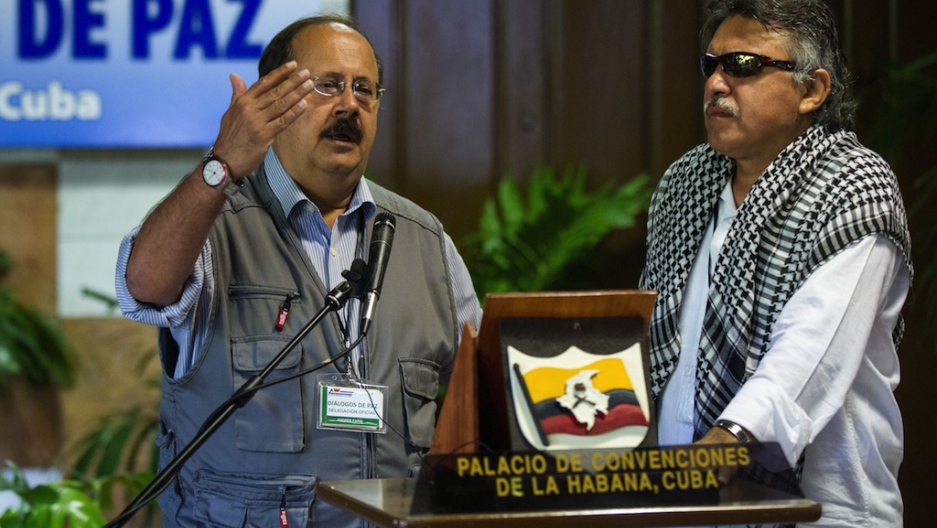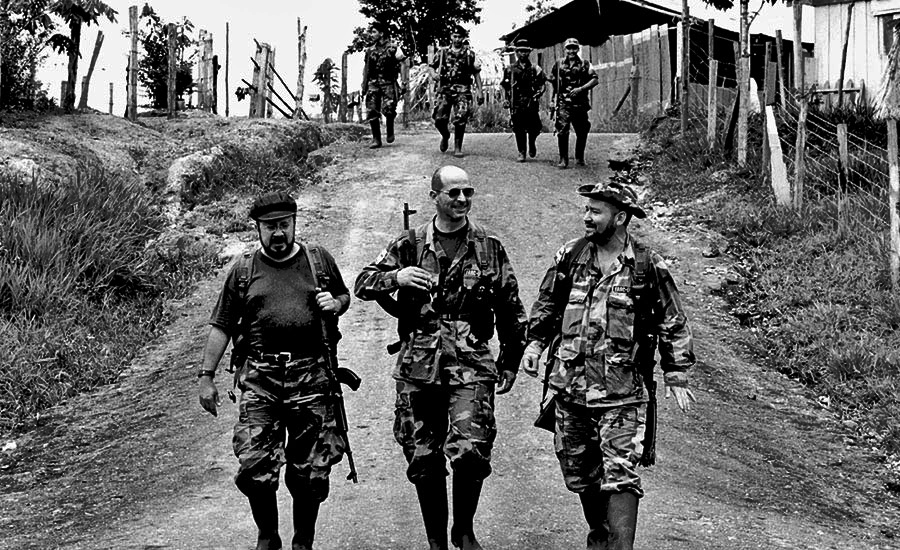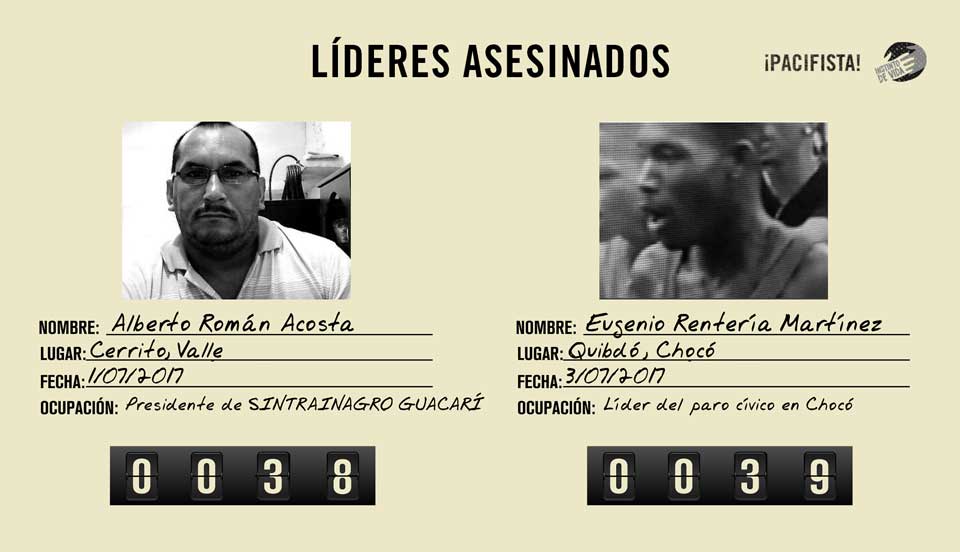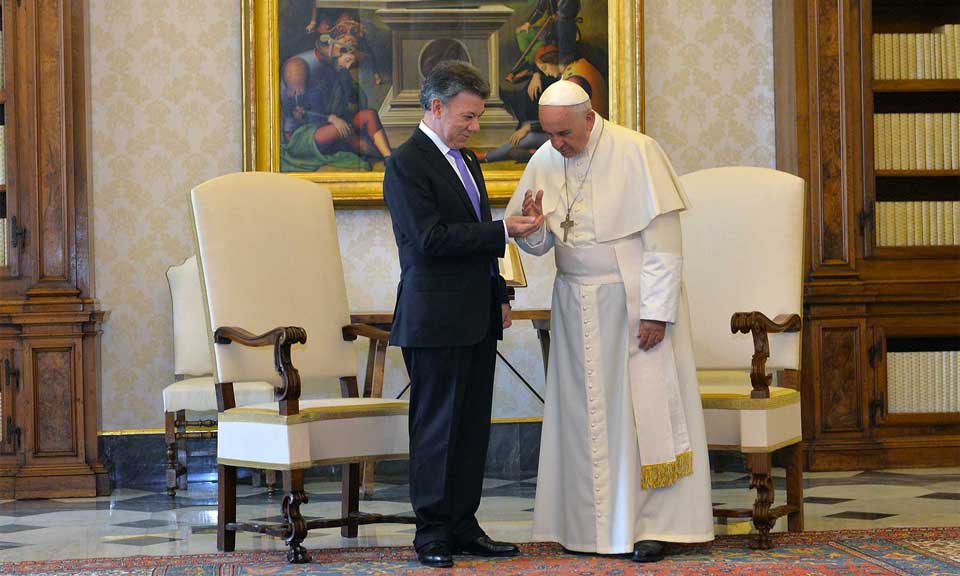
In a dialogue ranging from the violent past to the precarious future, The Bogotá Post’s Illimani Patiño speaks with Andrés París, a former high-ranking chief of the FARC-EP Eastern Bloc and key figure of the peace agreements.
Andres París joined the FARC in 1985 after a long-lasting stint in the youth branch of the Colombian Communist Party (PCC). He has had several high-ranking positions in the 80s and 90s related to the political formation of the guerrilla members and, in later years, in the international commission, where he performed lobbying activities with foreign governments and allied organizations.
In the last decade, París was known for being the chief of the eastern block of the FARC and he was part of the negotiating council of the guerrilla group in the Havana peace talks until 2014. From the beginning of his time with the FARC, Paris, whose real name is Jesús Emilio Carvajalino, enjoyed sympathy from the FARC secretariat (central high command), because he was married to Beatriz Arenas, daughter of the historic leader of the Jacobo Arenas Front. Nevertheless, some affirm that he didn’t enjoy the same sympathy from the lower ranks due his alleged heavy-handed methods. Indeed, he was sanctioned twice by his own group because of abuses against his subordinates.
Reflecting on his time with the guerrilla movement, Andrés París spoke with us on the armed conflict, the implementation of the peace accords and the future of the political organization.
A non-violent strategy
Two years after the peace agreement ended more than five decades of armed conflict between the Colombian government and the Revolutionary Armed Forces of Colombia (FARC), the country struggles to unite society and meet the commitments outlined in the agreement.
Current Colombian President Iván Duque won the elections following an anti-peace deal campaign, where he promised to “reform what is wrong and support what is right.” This conciliatory position is at odds with the official position of his own party’s honorary leader Fernando Londoño, who said in 2017 that Centro Democrático’s first challenge will be “tearing apart that paper called the final agreement.”
París said that, from the FARC’s perspective, “the non-implementation of the accords is a strategy by the state and its ruling class.” Today only 20 percent of the peace deal’s goals have been achieved and the movement feels that the state ‘fools’ them when not fulfilling its pledges, something worsened with “a government that promises to change what is already signed.”
“If I had been asked about it I wouldn’t have allowed [the El Nogal club bombing], but people must know that it was the place where paramilitary leaders and the government were gathering together to plan the massacres”
Although 61 percent of the 578 provisions included in the peace agreements have seen some progress–this according to the Kroc Institute of the Notre Dame University–the parts of the deal relating to the ‘solution to the problem of illicit drugs’ and ‘integral rural reform’ (the core part of the agreement from the FARC’s perspective) have only reached 3 percent completion.
What’s even more distressing is that the country has seen more than 300 social leaders and at least 70 ex-FARC members killed since the signing of the agreement. Most killings have occured in rural areas and historically excluded regions of the country, where neo-paramilitary groups and drug cartels seem to be gaining momentum.
Paris added that the left in Colombia has been under a dramatic transformation over the past few years, which showed when leftist candidate Gustavo Petro took Duque to a runoff vote in last year’s elections.
“The establishment doesn’t see us as a threat anymore, but they do fear the massive social movement that is gaining momentum in all the regions: students, farmers, teachers and workers (…) we could only get 50,000 votes, but Petro, who represents the demands of those groups, got 8 million votes.”
This fear of the establishment is what explains the joint effort of violence that involves the state, the elites and paramilitary groups against social leaders, the ex-FARC leader claimed.
París warned that the killing of social leaders could trigger the creation of armed groups who would resist the violence by paramilitaries, which would mean the revival of the armed conflict that was supposed to be over with signing of the peace agreement.
But he also said that the decision taken by the FARC was following a democratic and non-violent path and they see no possible scenario where they will come back to the armed struggle.

Rural communities remain in limbo
According to París, the peace accords didn’t help to transform Colombia into a more democratic or fairer country for the majority of the people. For him, in retrospect, the accords achieved only to “make the FARC give away their arms but they are failing to fulfill the other six points agreed.” These points, in the former FARC leader’s opinion sought to make minor but important transformations in the political and economic background of the country.
One of those points is agrarian reform, symbolically the first in the agreement as the origin of the movement was within the ‘independent republics’ created by the liberal farmers in the 1950s that would later turn into communism. The arrangements made by the two parties regarding the agrarian question have barely been addressed and the FARC leaders have been persisting in denouncing the alleged lack of funding into the projects that were supposed to be the base of an agrarian reform.
Nevertheless, the group also recognizes that the peace accords managed to shift the main political discussions of Colombian society from the war to the social and economic problems of the people.
“The fact that the discussion regarding previous business of the finance minister Alberto Carrasquilla is the main political scandal of the last few months demonstrates that the ruling class is not focused on violent confrontations to defend their interests anymore,” París said.
Past controversies, future opportunities
To date, the Special Tribunal for Peace has recorded 4,653 former FARC members who are willing to have their cases heard by the court in exchange for more lenient sentences. When questioned about the crimes against human rights made by the armed group, París was resolute in his opinion that most of the crimes were punished by their own military courts with the death penalty and there it has always been a media exaggeration to magnify the mistakes that did occur.
“In my 34 years in the armed group, I never knew about any order to rape anybody, because we had our own rules and those who violated the rules would be punished with the firing squad,” he said.
He also highlighted the protection they gave to the prisoners captured during combat with the Colombian army. From his perspective, they protected and helped them recover.
“We didn’t mistreat the prisoners of war that we kept under captivity,” París added. “They lived in the same condition as the guerrilla fighters (…) it was the government who never wanted to make the humanitarian trade that we proposed and we unilaterally decided to release more than 500 hundred soldiers and policemen that we captured.”
Despite having guaranteed membership in the Colombian Congress, the new FARC political party that grew out of the armed resistance has shown little momentum in the last legislative elections having less than one percent of the popular vote, a clear sign that the majority in Colombia hasn’t forgotten or forgiven what happened in the past.
Finally, we asked a question that reflected the violent past, about the FARC-planned El Nogal club car bomb, an attack that killed 36 civilians in 2003 and has parallels with the most recent terrorist attack by the ELN in Bogotá.
“If I had been asked about it I wouldn’t have allowed it, but people must know that it was the place where paramilitary leaders and the government were gathering together to plan the massacres,” París said. “We were an organization composed of men and women who could commit mistakes. But our own by-laws stated the punishment for them.”


